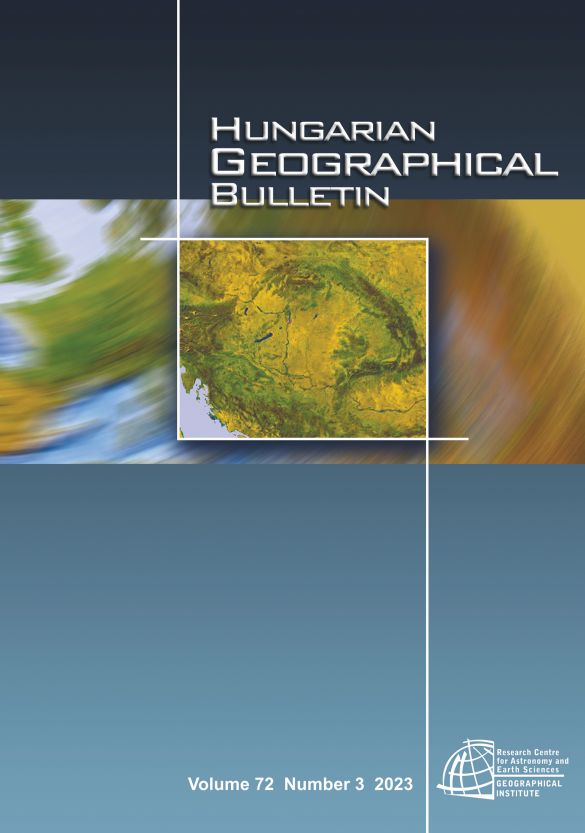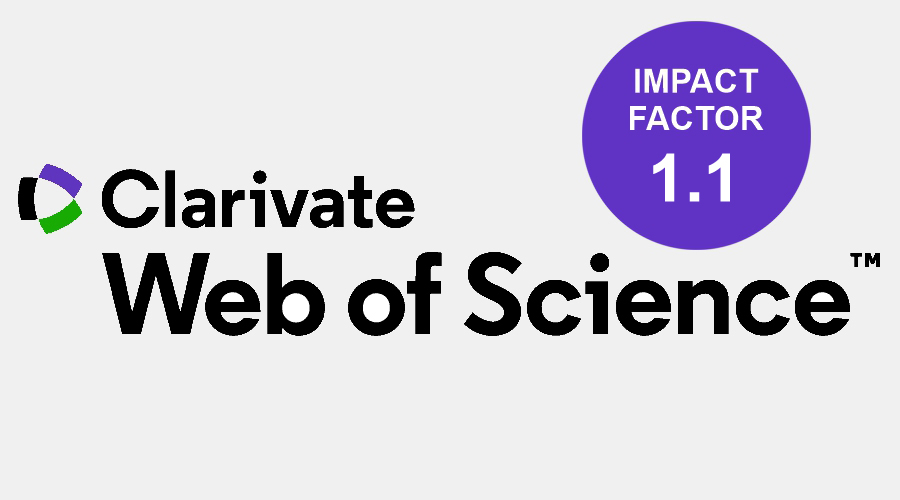From geopolitical fault-line to frontline city: changing attitudes to memory politics in Kharkiv under the Russo-Ukrainian war
Abstract
The article investigates changing attitudes to memory politics in Ukrainian city of Kharkiv. In February 2022, with the outbreak of the full-scale Russo-Ukrainian war, this geopolitical fault-line city became a frontline city with significant potential outcomes for urban identity and local geopolitical preferences, including attitudes to the national memory politics. The research is based on the comparative analysis of the two surveys among residents of Kharkiv, conducted in spring-summer 2018 and in autumn 2022 – before and after the full-scale war. The results of the surveys are analysed by means of descriptive statistics and binary logistic regression. Additionally, two focus groups were held in order to receive additional justification when interpreting the results of the survey. The research shows that the attitudes to Ukrainian nation-centric memory narrative, including both decommunisation and decolonisation, have significantly improved. Nevertheless, public attitudes to the memory politics in the frontline city are highly reflexive in nature and deeply embedded in the context of the ongoing war. The geopolitical divide, which existed before the war, has largely transformed into a cultural one, namely heterogeneity of attitudes to the Russian cultural heritage in the city. This softened albeit still existing divide has, to some extent, materialised in physical space and runs between the ardent supporters of decommunisation and decolonisation that massively fled from the atrocities of the war and their opponents who at most choose (or were obliged) to stay in the front-line city. The study reveals that military conflicts may either activate hidden geopolitical divides in geopolitical fault-line cities or contribute to their transformation or even disappearance.
References
Barkawi, T. 2022. War and decolonization in Ukraine. New Perspectives 30. (4): 317-322. https://doi.org/10.1177/2336825X221132935
Bitušíková, A. 2022. Transformations of place, memory and identity through urban place names in Banská Bystrica, Slovakia. Hungarian Geographical Bulletin 71. (4): 401-417. https://doi.org/10.15201/hungeobull.71.4.6
Buckholz, Q. 2019. The dogs that didn't bark. Problems of Post-Communism 66. (3): 151-160. https://doi.org/10.1080/10758216.2017.1367256
Cerutti, F. 2006. Identitet i Politika (Identity and Politics). Zagreb, Politička Kultura.
Coward, M. 2009. Urbicide. The Politics of Urban Destruction. Oxon, Routledge. https://doi.org/10.4324/9780203890639
Fedinec, C. and Csernicsko, I. 2017. (Re)conceptualization of memory in Ukraine after the Revolution of Dignity. Central European Papers 1. 46-71. https://doi.org/10.25142/cep.2017.003
Filippova, O. and Giuliano, E. 2017. 'Neither with Europe nor with Russia': tracking views in Kharkiv. Visnyk of V.N. Karazin Kharkiv National University. Series "Sociological studies of contemporary society: methodology, theory, methods." 39. 269-274.
Gaidai, O., Sklokina, I. and Kasianov, G. (eds.) 2018. Polityka i Pamiat. Dnipro-Zaporizhia-Odesa-Kharkiv. Vid 1990-h do Siohodni. Lviv, FOP Shumylovych.
Gaidai, O. 2021. Leninfall in Ukraine: How did the Lenin statues disappear? Harward Ukrainian Studies 38. (1-2): 45-69.
Gentile, M. 2015. West oriented in the east-oriented Donbas: A political stratigraphy of geopolitical identity in Luhansk, Ukraine. Post-Soviet Affairs 31. (3): 201-223. https://doi.org/10.1080/1060586X.2014.995410
Gentile, M. 2017. Geopolitical fault-line cities. In Migration and the Ukraine Crisis: A Two-Country Perspective. Eds.: Pikulicka-Wilczewska, A. and Uehling, G., Bristol, E-International Relations. Available at www.e-ir.info/wp-content/uploads/2017/06/Migration-and-The-Ukraine-Crisis-E-IR.pdf
Gentile, M. 2019. Geopolitical fault-line cities in the world of divided cities. Political Geography 71. 126-138. https://doi.org/10.1016/j.polgeo.2019.03.002
Gentile, M. 2020a. Diabolical suggestions: Disinformation and the curious scale of nationalism in Ukrainian geopolitical fault-line cities. Geopolitics. https://doi.org/10.1080/14650045.2020.1830766
Gentile, M. 2020b. The 'elephant' in Mariupol: what geopolitical moods prevail in the city. Vox Ukraine. Available at https://voxukraine.org/en/the-elephant-in-mariupol/
Gnatiuk, O. 2018. The renaming of streets in post-revolutionary Ukraine: Regional strategies to construct a new national identity. Acta Universitatis Carolinae Geographica 53. (2): 119-136. https://doi.org/10.14712/23361980.2018.13
Gnatiuk, O. and Melnychuk, A. 2020. Geopolitics of geographical urbanonyms: Evidence from Ukrainian cities. Acta Universitatis Carolinae Geographica 55. (2): 255-268. https://doi.org/10.14712/23361980.2020.19
Gnatiuk, O., Mezentsev, K. and Pidgrushnyi, G. 2022. Rethinking of identity under war: Pryazovia renaissance and regional centre ambitions in Mariupol before 2022. Hungarian Geographical Bulletin 71. (3): 271-286. https://doi.org/10.15201/hungeobull.71.3.4
Gnatiuk, O. and Basik, S. 2023. Performing geopolitics of toponymic solidarity: The case of Ukraine. Norsk Geografisk Tidsskrift/Norwegian Journal of Geography. E-publication on 6 February 2023. https://doi.org/10.1080/00291951.2023.2170827
Gnatiuk, O. and Melnychuk, A. 2023. De-Russification of urban namescapes in Ukraine: Rigged trial or justice restored? Names: A Journal of Onomastics (in print).
Golikov, A. 2020. (Re-)naming and decommunisation in Ukrainian: Macropolicies, historical memory and the risks of mediatisation (Kharkiv case). Ideology and Politics Journal 15. (1): 33-62.
Ivanenko, V. and Kryvoshein, V. 2022. Derzhavna polityka pamiati v suchasnij Ukrajini v umovakh informatsijnoji vijny (2014-2021 rr.). HRANI 25. (2): 16-21.
Kharkiv Today 2022. Mista bez Pushkina. Chomu u Kharkivskij oblasti povilno jde derusyfikatsija? Available at https://2day.kh.ua/ua/kharkow/mista-bez-pushkina-chomu-u-kharkivskiy-oblasti-povilno-yde-derusyfikatsiya
Kovalov, M. 2022. When Lenin becomes Lennon: Decommunization and the politics of memory in Ukraine. Europe-Asia Studies 74. (5): 709-733. https://doi.org/10.1080/09668136.2022.2078478
Kravchenko, V. 2020. Borderland city: Kharkiv. East/ West: Journal of Ukrainian Studies 7. (1): 3-6. https://doi.org/10.21226/ewjus567
Kravchenko, V. and Musiyezdov, O. 2020. Kharkiv: The elusive city. East/West: Journal of Ukrainian Studies 7. (1): 3-6. https://doi.org/10.21226/ewjus567
Kuczabski, A. and Boychuk, A. 2020. Decommunization of urban toponymy in Ukraine: Causes and consequences. Journal of Geography, Politics and Society 10. (4): 8-16. https://doi.org/10.26881/jpgs.2020.4.02
Kudriavtseva, N. 2020. Reconfiguring identities within the cityscape: Ideologies of decommunization renaming in Ukraine. Ideology and Politics Journal 15. (1): 63-82.
Kulyk, V. 2011. Language identity, linguistic diversity and political cleavages: Evidence from Ukraine. Nations and Nationalism 17. (3): 627-648. https://doi.org/10.1111/j.1469-8129.2011.00493.x
Kulyk, V. 2016. National identity in Ukraine: Impact of Euromaidan and the war. Europe-Asia Studies 68. (4):588-608. https://doi.org/10.1080/09668136.2016.1174980
Kulyk, V. 2019. Identity in transformation: Russianspeakers in post-Soviet Ukraine. Europe-Asia Studies 71. (1): 156-178. https://doi.org/10.1080/09668136.2017.1379054
Kutsenko, D. 2020. Experience of implementing decommunization laws in Eastern Ukraine: A Kharkiv case. Journal of Geography, Politics and Society 10. (3): 55-64. https://doi.org/10.26881/jpgs.2020.3.06
Kuzio, T. 2019. Russian stereotypes and myths of Ukraine and Ukrainians and why Novorossiya failed. Communist and Post-Communist Studies 52. (4): 297-309. https://doi.org/10.1016/j.postcomstud.2019.10.007
Laruelle, M. 2015. The three colours of Novorossiya, or the Russian nationalist mythmaking of the Ukrainian crisis. Post-Soviet Affairs 32. (1): 55-74. https://doi.org/10.1080/1060586X.2015.1023004
Malykhina, S. 2020. Change and continuity in the urban semiosphere of post-Soviet Kharkiv. East/West: Journal of Ukrainian Studies 7. (1): 58-104. https://doi.org/10.21226/ewjus569
Marples, D. 2018. Decommunization, memory laws, and "builders of Ukraine in the 20th century". Acta Slavica Iaponica 39. (1): 1-22.
Mihaylov, V. 2020. Ethnoterritorial divisions and urban geopolitics in post-Yugoslav Mostar. In Spatial Conflicts and Divisions in Post-socialist Cities. The Urban Book Series. Ed.: Mihaylov, V., Cham, Springer, 91-110. https://doi.org/10.1007/978-3-030-61765-3_6
Minakov, M. 2017. Novorossiya and the transnationalism of unrecognized post-Soviet nations. In Transnational Ukraine? Networks and Ties that Influence(d) Contemporary Ukraine. Eds.: Beichelt, T. and Worschech, S., Stuttgart, ibidem Press, 65-88.
Musiyezdov, O. 2009. Kharkivska Identychnist: Ujavlennia pro Misto ta Joho Istoriju jak Chynnyky Identyfikatsiji. Essay-urban. The Online Publication Series of the Centre for Urban History of East Central Europe 5. Available at: http://dspace.univer.kharkov.ua/bitstream/123456789/8939/2/Musiyezdov_ukr_5.pdf
Musiyezdov, O. 2022. Do national and geopolitical identities explain attitudes to decommunisation? A comparison of Dnipro and Kharkiv. In Ukraine's Outpost: Dnipropetrovsk and the Russian-Ukrainian War. Eds.: Kuzio, T., Zhuk, S.I. and D'Anieri, P., Bristol, England, E-International Relations, 164-190. Availableat https://www.e-ir.info/publication/ukraines-outpost-dnipropetrovsk-and-the-russian-ukrainian-war/
Nitsova, S. 2021. Why the difference? Donbas, Kharkiv and Dnipropetrovsk after Ukraine's Euromaidan Revolution. Europe-Asia Studies 73. (10): 1832-1856. https://doi.org/10.1080/09668136.2021.1912297
Pletnyova, G. 2020. Linguistic diversity in Kharkiv: Between "pride" and "profit," between the local and the global. East/West: Journal of Ukrainian Studies7. (1): 105-128. https://doi.org/10.21226/ewjus570
Portnov, A. 2013. Memory wars in post-Soviet Ukraine (1991-2010). In Memory and Theory in Eastern Europe. Eds.: Blacker, U., Etkind, A. and Fedor, J., New York, Palgrave Macmillan, 233-254. https://doi.org/10.1057/9781137322067_12
Portnov, A. 2015. Post-Maidan Europe and the new Ukrainian studies. Slavic Review 74. (4): 723-731. https://doi.org/10.5612/slavicreview.74.4.723
Pshenychnykh, A. 2019. Leninfall: The spectacle of forgetting. European Journal of Cultural Studies 23. (3): 392-414. https://doi.org/10.1177/1367549419871345
Rating Sociological Group 2022. The Tenth National Survey: Ideological Markers of the War (27 April 2022). Available at https://ratinggroup.ua/en/research/ukraine/desyatyy_obschenacionalnyy [...]
Różycki, B. 2017. Renaming urban toponymy as a mean of redefining local identity: The case of street decommunisation in Poland. Open Political Science 1. 20-31. https://doi.org/10.1515/openps-2017-0004
Šakaja, L. and Stanić, J. 2017. The spatial codification of values in Zagreb's city-text. In The Political Life of Urban Streetscapes: Naming, Politics, and Place. Eds.: Rose-Redwood, R., Alderman, D. and Azaryahu, M., Abingdon, U.K., Routledge, 151-167. https://doi.org/10.4324/9781315554464-9
Schmidtke, O. and Yekelchyk, S. (eds.) 2008. Europe's Last Frontier? Belarus, Moldova, and Ukraine between Russia and the European Union. New Yok, Palgrave Macmillan.
Shevel, O. 2011. The politics of memory in a divided society: A comparison of post-Franco Spain and post-Soviet Ukraine. Slavic Review 70. (1): 137-164. https://doi.org/10.5612/slavicreview.70.1.0137
Stebelsky, I. 2018. A tale of two regions: Geopolitics, identities, narratives, and conflict in Kharkiv and the Donbas. Eurasian Geography and Economics 59. (1): 28-50. https://doi.org/10.1080/15387216.2018.1428904
Suspilne Novyny 2022a. Prybraty z vulyts "russkij mir": Kharkivjany zvernulys do Terekhova. Availableat https://suspilne.media/218427-pribrati-z-vulicrusskij-mir-harkivani-zvernulis-do-terehova/
Suspilne Novyny 2022b. Kharkiv pozbudetsia toponimiv, povjazanykh z Rosijeju, і dast vulytsiam imena zakhysnykiv - Terekhov. Available at https://suspilne.media/233285-harkiv-pozbudetsatoponimiv-povazanih-z-rosieu-i-dast-vulicamimena-zahisnikiv-terehov/
Suspilne Novyny 2022c. U Kharkovi perejmenuvaly Moskovskyj rajon, prospect i dvi vulytsi povjazani z RF. Available at https://suspilne.media/238147-harkivska-meria-pogodila-perejmenuvanna-cotiroh-toponimiv-u-misti-spisok/
Suspilne Novyny 2022d. Kharkivska toponimichna hrupa proponuje povernuty v ramkakh derusyfikatsiji istorychni nazvy vulytsiam. Available at https://suspilne.media/257857-harkivska-toponimicna-grupaproponue-povernuti-v-ramkah-derusifikaciiistoricni-nazvi-vulicam/
Zhurzhenko, T. 2011. 'Capital of despair' - Holodomor memory and political conflicts in Kharkiv after the Orange Revolution. East European Politics & Societies 25. (3): 597-639. https://doi.org/10.1177/0888325410387646
Zhurzhenko, T. 2015. The fifth Kharkiv. New Eastern Europe 17. (3-4): 30-37.
Zhurzhenko, T. 2016. Borders and memory. In The Routledge Research Companion to Border Studies. Ed.: Wastl-Walter, D., London, Routledge, 85-106. https://doi.org/10.4324/9781315612782-14
Zhurzhenko, T. 2022. Legislating historical memory in post-Soviet Ukraine. In Memory Laws and Historical Justice. Eds.: Barkan, E. and Lang, A., Cham, Palgrave Macmillan, 97-130. https://doi.org/10.1007/978-3-030-94914-3_5
Zorko, M. and Novak, N. 2019. Classifying divided cities: The need for geopolitical perspective? Sociology and Space 57. (2): 159-171.
Zorko, M. 2020. Divided space or divided Society? The case of Vukovar. In Spatial Conflicts and Divisions in Post-socialist Cities. The Urban Book Series. Ed.. Mihaylov, V., Cham, Springer, 75-90. https://doi.org/10.1007/978-3-030-61765-3_5
Copyright (c) 2023 Oleksiy Gnatiuk, Mykola Homanyuk

This work is licensed under a Creative Commons Attribution-NonCommercial-NoDerivatives 4.0 International License.






